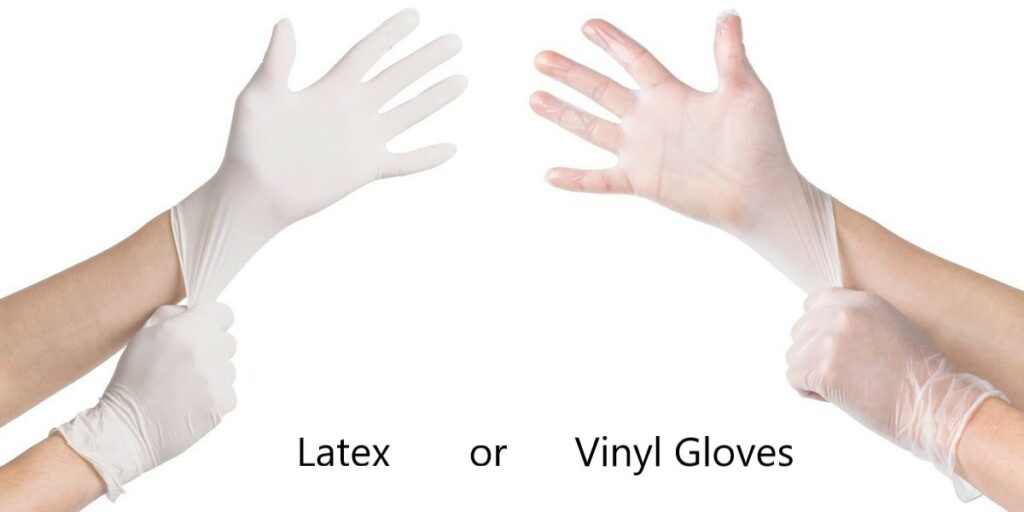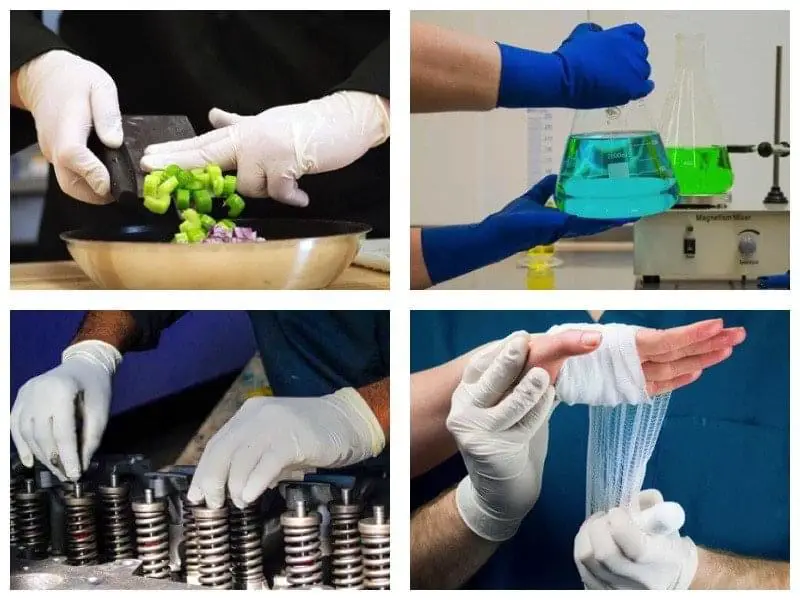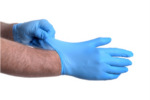Many caring tasks necessitate the use of surgical gloves. Gloves protect your skin and the skin of your loved ones, lower the danger of bacterial contamination, and provide a more hygienic atmosphere.
However, if you’re new to the field, it’s natural to be confused about the differences between vinyl and latex gloves.
These glove materials appear to be identical, yet they have distinct advantages and disadvantages. While this should come as no surprise, you may not be aware that not all disposable gloves are made equal.

Latex gloves are made of natural rubber, whereas vinyl gloves are composed of raw synthetic materials, mostly PVC. Latex gloves are more resistant to rip and puncture, and they are also more waterproof since it is easy to adjust the degree of microholes, making them safer for high-risk occupations, such as working with biological materials. Because vinyl gloves contain no natural proteins, they can also be used by those who are sensitive to latex proteins.
Generally, disposable gloves are constructed of one of three materials: latex, nitrile, or vinyl. In this article, we’ll look especially at latex and vinyl and what distinguishes these gloves from each other.
Difference between latex and vinyl gloves
Latex gloves
Latex gloves are rubber gloves. They’re comfy and utilised for medicinal purposes, and promote good hand movement.
Latex gloves are excellent for most clinical settings due to their high levels of flexibility, protection, and comfort, as long as latex allergies are not a concern.
They are made of natural material and therefore, they are biodegradable.
Most latex gloves are powder-lined, making them simpler to put on, and they are often thinner, increasing touch sensitivity.
Vinyl gloves
Vinyl gloves are composed of a synthetic polymer, although they are frequently thinner and less durable. Vinyl is ideal for non-hazardous applications, but it lacks flexibility.
The key advantage of vinyl disposable gloves is their low cost of production. However, they are less durable than latex and nitrile, and they provide only minimal protection against chemical or biological exposure.
They’re made of synthetic material and therefore, they are non-biodegradable.
They have a looser fit and are more commonly seen in the food business, where durability and protection are less critical. They were also created as a good alternative for people who are allergic to latex.
Here are the pros and cons of latex and vinyl gloves.
Pros of Latex Gloves
1. It’s as comfortable and fits properly.
2. They are affordable.
3. They are very elastic and sturdy.
4. They are biodegradable, making them better for the environment.
5. Very agile.
6. They are preferred over vinyl or nitrile in the medical business since they are derived from a natural source.
Cons of Latex Gloves
1. Latex can cause allergic reactions.
2. Might puncture and tear easily.
3. Not enough protection from chemicals and toxins.
Pros of Vinyl Gloves
1. Water-resistant.
2. Affordable.
3. They are among the cheapest and most economical gloves available.
4. Great choice for a non-hazardous environment.
5. They are latex free and free of allergens.
6. Water and oil resistant
7. Better suited to low-risk jobs and non-hazardous materials.
Cons of Vinyl Gloves
1. Because of the looser fit, they provide less dexterity.
2. Punctures and rips are common.
3. Lower resistance to chemicals and toxins.
4. It is not breathable.
Where are each of these gloves mostly used?
Since latex offers good resistance against various chemicals, they are mostly used in:
-
-
- Dental, hospital, and cosmetic industries.
- Housekeeping and janitorial services.
- The automobile industry.
- The manufacturing industry.
-

Latex gloves are comfortable, but they pose the danger of an allergic reaction because they are made of latex. As long as you or anyone you know does not have a latex allergy, they are safe to use in practically any circumstance.
Vinyl gloves are a good alternative to latex and nitrile gloves. They have a looser fit and are more commonly found in the food business.
Vinyl gloves are mostly used in:
-
-
- Industry of food preparation.
- Low-risk health care.
- Mild cleaning.
- Housekeeping and janitorial services.
- The automobile industry.
- The manufacturing industry.
-
Because vinyl gloves are more elastic than nitrile or latex gloves, they tend to fit more loosely. Avoid wearing them when changing diapers, bathing, or assisting anyone while using the bathroom.
Vinyl gloves are great if you have a limited budget, simply require gloves for a few minutes, or need to protect your hands when preparing snacks, beverages, or meals.
Here is a chart to help you better understand the features of latex and vinyl gloves (the marking is from 1-5):
| Features | Latex | Vinyl |
| Tear resistant | 5 | 2 |
| Abrasion resistant | 4 | 3 |
| Flexibility & stretch | 5 | 2 |
| Heat resistant | 4 | 3 |
| Puncture resistant | 4 | 2 |
| Cut resistant | 5 | 3 |
| Chemicals & toxins resistant | 4 | 2 |
Certain gloves are better suited for certain medical situations due to material and design choices. Furthermore, if you order the incorrect sort of glove for your practise, you may wind up squandering money and increasing the danger of punctures, rips, and tears.
Benefits of wearing gloves
1.) They protect your hand- Gloves make you resistant to a variety of chemicals and physical risks. They are used to protect hands in addition to avoiding cross contamination in medical facilities.
To treat patients, physicians, nurses, and other medical staff employ a wide range of medications and substances. If a medical practitioner is exposed to certain medications and substances, he may experience major health problems.
Gloves provide excellent protection against all types of toxins and chemicals. Gloves should be durable and hence protect users from a variety of physical risks that might inflict cuts, bruises, and piercings on their hands.
2.) To Avoid Cross-Contamination- One of the primary functions of gloves is to avoid cross contamination. This we have seen during the covid19 pandemic where masks and gloves were frequently used to avoid contamination.
Just as the patient can infect the doctor or nurse, he can also be infected by them. While treating a patient, medical workers wear gloves to keep their hands from coming into touch with blood, mucus, and other body fluids.
When inspecting or treating patients, all nurses, physicians, nurses, caretakers, and other medical staff are required to use disposable gloves.
3.) Grip and touch sensitivity will be improved- Any work that requires physical contact with customers, gloves are ideal in such an environment.
You never know what type of flu a person is carrying, therefore, you need to make sure of your safety always. Gloves are specifically constructed with sufficient texture and finger thickness to ensure dexterity and improve grip.
Some FAQs-
1.) Do hospitals use latex or vinyl gloves?
Usually, latex gloves are used in hospitals by doctors and nurses as it is the most common material used to make medical grade gloves.
For many years, latex has been the preferred material for the manufacture of medical gloves and for all the right reasons.
2.) Which gloves are right for you?
Choosing the appropriate glove totally depends on the application, allergies, and cost. Remember to select a glove that is the perfect size for your hand.
This will not only give the most comfortable fit, but will also protect the gloves from slipping off your hands, lowering the possibility of accidentally ruining the glove itself.
Conclusion
So, now that you understand the distinctions between materials, you should be able to make an informed selection about which gloves to purchase.
However, the best gloves are those with the lowest risk of chemical and disease exposure. Although none of these items is fully risk-free, latex gloves pose the fewest concerns and are appropriate for all low-risk jobs.
Hope this article helps you in making a wise decision!







